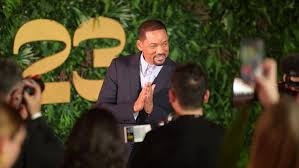Andrew Garfield Gets Existential


We’re experiencing something of a Garfieldaissance at the moment: Andrew Garfield has starred in four projects released since 2020 — not to mention a surprise cameo in Spiderman: No Way Home that caused heart palpitations in movie theaters everywhere — the latest being his role as Mormon police officer Jeb Pyre in the new FX series Under the Banner of Heaven, based on the true-crime book of the same name. Although the 38-year-old doesn’t use social media, Twitter is brimming with fancams and stan accounts reminiscent of the many Tumblr blogs devoted to him in the early 2010s.
Part of Garfield’s appeal — beyond his face — is that he seems entirely in touch with himself and his feelings, and it all comes through in his work and in all of his interactions. With all the heart and wholeness he puts into his work, it makes sense that he has decided to take a break after Under the Banner of Heaven.
With every project, Garfield is ultimately digging for the molten core of how to be human. Jeb, the fictional devout Mormon and principled detective he plays in Under the Banner of Heaven, is forced into doubting all the answers he thought he knew to that question when he starts investigating the very real 1984 murder of 24-year-old Brenda Lafferty and her infant daughter, Erica — a murder he soon learns is deeply tied to his own religion. “Ultimately,” Garfield tells the Cut, “we can never know more than maybe one percent of what it is to be a person while we’re conscious.”
Watching Under the Banner of Heaven not long after I saw The Eyes of Tammy Faye got me thinking — it seems like there’s a through-line in your career of projects that address institutional corruption, as early as The Social Network. Is there something that draws you to those kinds of projects?
For this particular project, I loved the book when it first came out. I think I was drawn to it because I was fascinated with how human beings — and in this case, these two men — can get to the point and be enabled to the point where they can do heinous evil acts in the name of God, in the name of love, in the name of righteousness.
Every institution is human-made, so there are going to be human cracks and flaws in every single institution. It’s fascinating to me to see how human beings can be corrupted by their own ego, power — adolescent, primal drives. How can we understand and integrate and own that in a way that we learn from it? Right now we’re in a time where the culture is in a lot of fear, a lot of uncertainty, a lot of pain, a lot of non-belonging, a lot of dislocation and dissociation from the fruits of life and from lives of meaning, for multiple reasons. I think in those times — and we’re witnessing it all the time — people are drawn to extremism and fundamentalism. We’re much more susceptible to that kind of manipulation of the strongman, or of the simplified version of life, a much more narrow, black-and-white version of life. It’s dangerous. How do we stay open and present to the multitudinous experience of reality that isn’t away from certainty and toward faith?
All of those things interest me, but mostly it’s about how to live. I am curious about how human beings organize themselves — how do we make meaning as we live? Religion and spirituality is kind of the quickest way to do a study on how we do that and where we go wrong, where we go right. Hopefully every project I do is a kind of attempt to get to a North Star of meaning and how we make lives of true aliveness.
Another big theme that I saw on the show was the value of community — yet it’s also a cautionary tale of the dangers of tribalism and how easy it is to go from community to cult. Did it affect the way you think about community in your own life or in general?
Definitely. I got it so hard because it’s all we all want. We want to belong to something greater than us, feel couched and comforted. As we live, we want to feel held, we want to feel contained. For me, I recall being in the hardest times in my life and knowing that there was a tribe of people that had my back and cared about me and loved me. That was what brought me through feeling like I wasn’t just going to be falling through the universe, tetherless.
We can be very tempted to sacrifice our own truth, sacrifice our own knowing, for the sake of belonging, of being accepted, of being liked, of being safe and protected and fed and clothed — all of those things. Absolutely, there’s a tension there to be acutely aware of. For Jeb Pyre, what he’s going through is How do I hold on to this foundation of my life: my faith, my religion, my family, my community, my kids, the internal structure of how my psyche is organized? I don’t want to have a nervous breakdown, I would rather just carry on in delusion and lie to myself rather than have to face the truth about how narrowly I’ve seen the world up until now.
That goes into how he sees and relates to his Native American partner. At the beginning of the journey, there’s a sense of superiority that he feels in an unconscious way, which he would never admit to himself until the end — he realizes that he’s discounted any other form of faith. There’s the one true church in his mind that has now been decimated. As light has been shed upon it, he sees that he has been living in a delusion and that actually, maybe his partner has answers to how to live that he’s now desperate to know. It’s a beautiful journey. It’s an expansion of the psyche, it’s a kind of breaking open of the heart. And it’s painful, but it’s the only way to live a life of truth and meaning — to be broken open by life and to let go of what we think we know. Because ultimately, we can never know more than maybe one percent of what it is to be a person while we’re conscious.
Although your character, Jeb, isn’t a real person, you are portraying real-life events. Is there a difference in how you prepare for roles like that?
I did speak to certain people who have had the same experience that Jeb has had — detectives who are in certain organized religions, who had big crises of their faith because of the cases that they were on and how it related to their faith and how it was these horrific acts done in the name of their God. It was humbling for sure, and it enabled me to treat Jeb as a real person.
I thought you spoke so beautifully on Stephen Colbert about grief and how art helps to sew up our wounds. With this show, it’s such heavy stuff — even just as a viewer, I came away from each episode needing to decompress. So much of what your character and other characters experience is so painful, so traumatic. Having to carry those heavy emotions, how do you process that?
The only way to heal the wound is to go into the wound and actually heal from the base of that wound, rather than putting a Band-Aid over it. One of the themes, and one of the things in this story, is my character is surrounded by his church superiors, and his police superiors, saying, “Put it on the shelf, put a Band-Aid on it, and move on.” The culture says that to us all the time, like, “Don’t feel your feelings too deep. Get over it quick. Always on the up and up.” There’s not a lot of actual reckoning. Until we actually fully reckon with the wounds of the past, we can’t heal in the present. That is on the personal level, and that is on the universal collective level.
Jeb knows if he’s to do his job properly, he has to reckon with the deep wounds of the past in order to understand how this happened and to make sure it doesn’t happen again in his vicinity, on his watch. He would like nothing more than to put a Band-Aid on it and just move on. But as more information is revealed to him, he realizes, Oh, I can’t. I have to keep picking at this scab in order to fully honor Brenda and Erica Lafferty, these two innocent people who were murdered so horrifically. I’m doing a disservice to them unless I go in deep. It’s a really important road to go down for Jeb, and it’s a road not often traveled by us. So yeah, it feels like an honoring.
Jeb is a police officer, and we see a lot of this story from that particular perspective. The role that police play in our society has been questioned and debated a lot — is that something that you thought about in playing this role?
Of course. When you think about police officers, the power that a police officer has is such a heavy duty and a heavy burden. When someone who has an intrigue with power gets given that powerful position, it’s evidently incredibly dangerous and incredibly irresponsible. Maybe if you want that kind of power, you should be automatically disqualified from that role. I think the same thing for the presidency: Anyone who wants to be president should not be allowed to be president. Someone who really understands what it is to lead a country — anyone who fully, humbly gets that — would not want the responsibility. We have to seek out the people that would run away from the job.
But then you have people who are really called to protect and to serve. There are people who feel genuinely called. It’s up to us as individuals to discern, Am I being genuinely called, or do I have an unhealthy draw to power because I feel powerless in my life somehow? And because of that powerlessness, am I going to enact my unmet issues on the people that I’m supposed to be protecting and serving? This is the psychological work that we have to do as a culture, and this is not something that we are much encouraged toward. Again, we’re encouraged to put a Band-Aid on it rather than actually deeply look at ourselves.
This interview has been edited and condensed.
By submitting your email, you agree to our Terms and Privacy Notice and to receive email correspondence from us.


 Canada
Canada Argentina
Argentina  Australia
Australia  Austria
Austria  Brazil
Brazil  Germany
Germany  Ireland
Ireland  Italy
Italy  Malaysia
Malaysia  Mexico
Mexico  New Zealand
New Zealand  Poland
Poland  South Africa
South Africa  United Kingdom
United Kingdom  United States
United States 



































